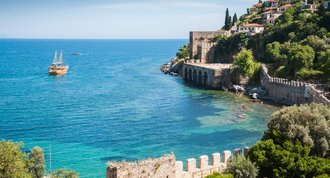
How big spenders are holidaymakers this summer? How much comfort do they allow themselves? How long are they travelling for and which destinations are at the top of the popularity scale? These and many other questions are answered by the DERTOUR Travel Barometer Summer 2022*.
Huge appetite for travel: bookings far in excess of 2019
The enormous demand for summer holidays shows just how great people's desire to travel is and how strong the longing for the sea, sun, beach and relaxation is: "Bookings in recent months have been far above the pre-pandemic level. And that's not all: revenue in summer 2022 for our tour operators DERTOUR, Jahn Reisen, ITS, Meiers Weltreisen and Travelix is also higher than in summer 2019," says Dr Ingo Burmester, CEO of DER Travel and Tourism Central Europe. "We have a new normality."
Despite the high demand, there are still beds available everywhere with a little flexibility, even in the peak holiday season: "There is no general shortage. If you are flexible with your arrival day or departure airport or consider an alternative hotel, you will still find something at your desired destination," explains Sven Schikarsky, Head of Product at DERTOUR, Jahn Reisen, ITS, Meiers Weltreisen and Travelix.
„We have a new normality“

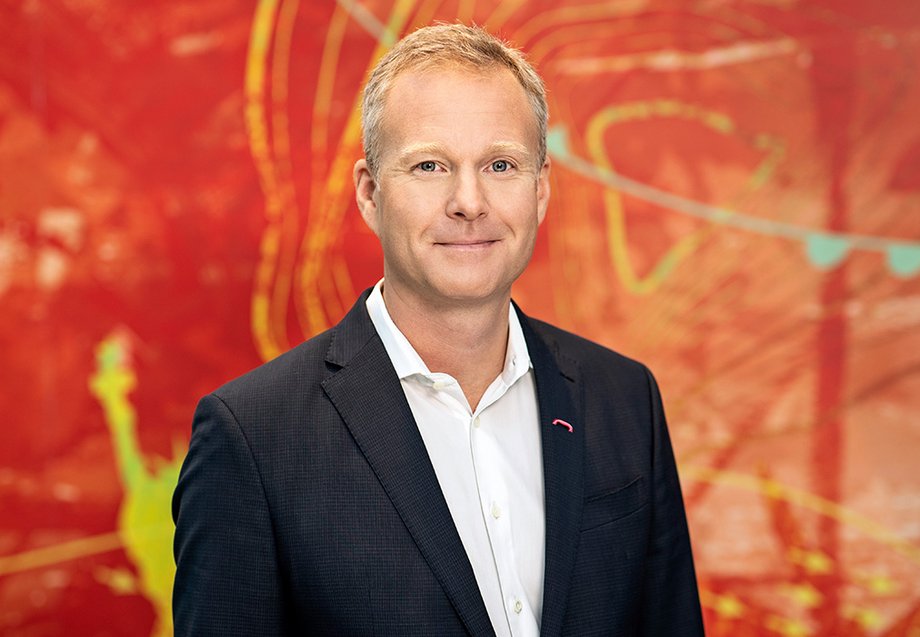 Sven Schikarsky
Attractively priced travel offers are still available - although 2022 is definitely not a last-minute year: "If you want to save money, book as early as possible. This also applies now for autumn and winter," says Schikarsky. His tip for the best deals at the moment: "The best summer bargains are currently available from DERTOUR and its sister brands for Egypt, Bulgaria and Tunisia."
Sven Schikarsky
Attractively priced travel offers are still available - although 2022 is definitely not a last-minute year: "If you want to save money, book as early as possible. This also applies now for autumn and winter," says Schikarsky. His tip for the best deals at the moment: "The best summer bargains are currently available from DERTOUR and its sister brands for Egypt, Bulgaria and Tunisia."
Higher hotel spending: More stars, more all-inclusive - desire for carefree comfort holidays
Guests have been longing for a holiday and are spending more money on their holidays in summer 2022 than before the pandemic in summer 2019 - and on higher-quality trips:
On average, holidaymakers are spending 51% more on their hotel stay. In particular, they booked higher hotel categories and more all-inclusive meals.
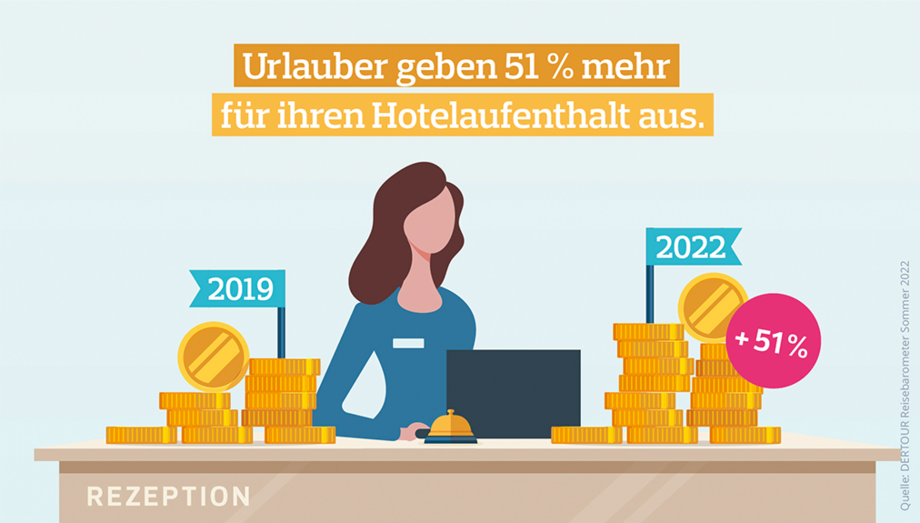
Hotels with three or fewer stars are booked less frequently than before the pandemic: in summer 2019, 40% of guests still opted for these categories. This year, only just over a quarter, namely 28%, booked hotels with a maximum of three stars. That is a whole 12 percentage points less than three years ago.
Most holidaymakers book four-star hotels: more than half of guests (51%) are staying in a four-star hotel this summer. This is 4% points more than in 2019, when the proportion was just 47%.
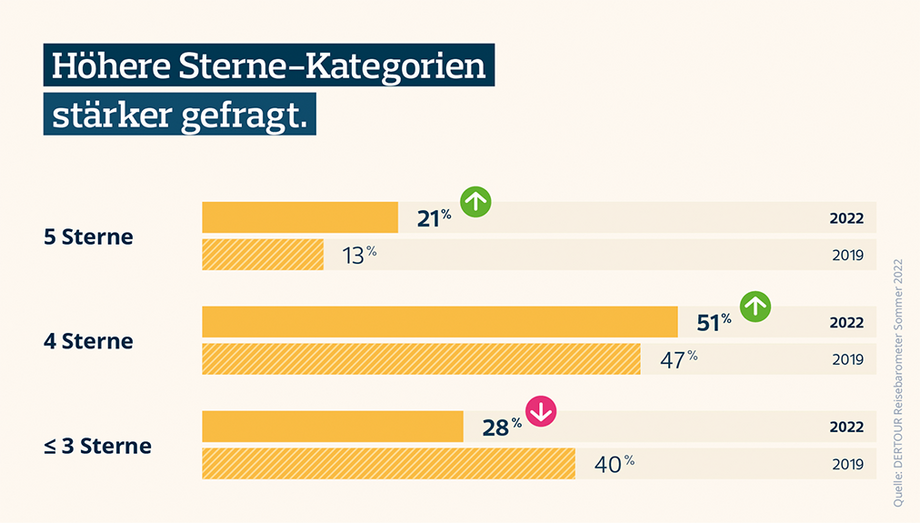
Demand for five-star hotels has also increased: While only 13% of guests opted for a five-star hotel in summer 2019, this figure is now 21%. This means that every 5th guest is holidaying in a five-star hotel this summer.
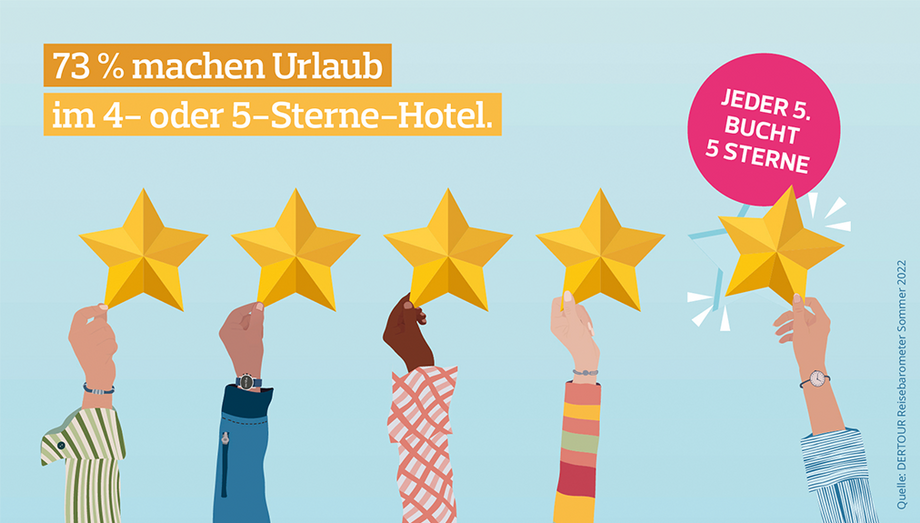
Almost three quarters of guests (73%) therefore book four- and five-star hotels. in 2019, it was only 60%.
One in five choose all-inclusive catering
In addition to more comfort, holidaymakers are also treating themselves to more indulgence this summer: while only 11% of guests chose all-inclusive catering in 2019, this summer the proportion is 21%, which is almost twice as high as three years ago. A fifth of holidaymakers are therefore treating themselves to the full indulgence programme this summer, opting for an all-round carefree pampering holiday without additional costs for meals at the holiday destination.
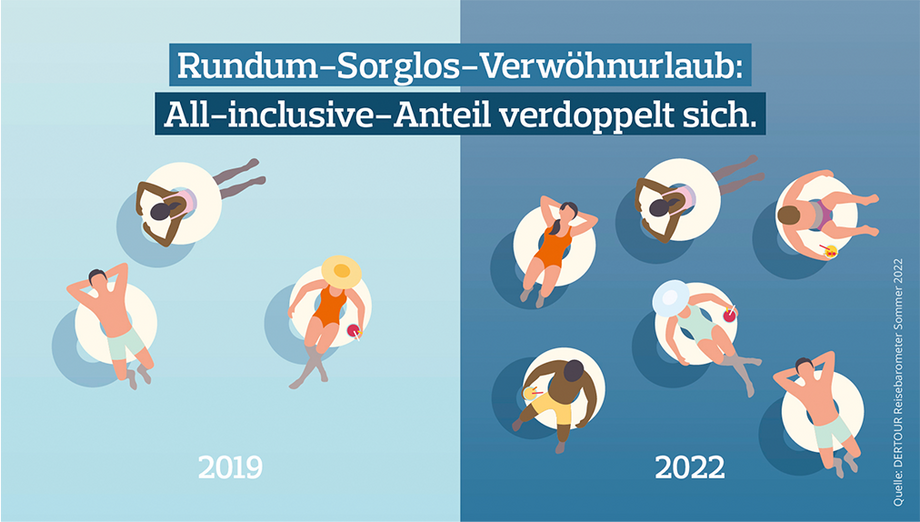
The figures for other types of catering are declining:
The most frequently booked meal type, breakfast, is still only chosen by half of holidaymakers (50%), down from 56% in 2019.
All-inclusive has pushed half board from second to third place: Only 16% of guests will choose half board in summer 2022, compared to just under a quarter (23%) in 2019.
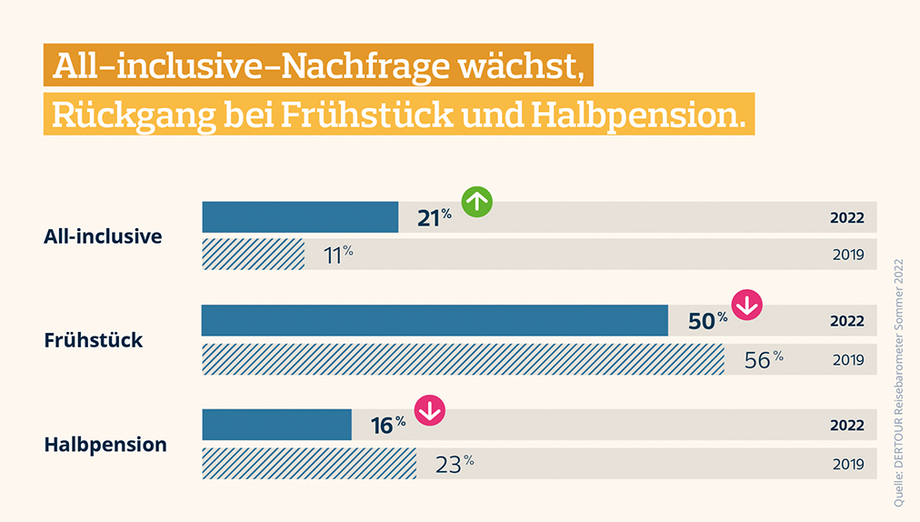
Holidaymakers are travelling longer - city breaks in Germany a third longer, beach holidays on medium and long-haul routes almost 1 day longer
In summer 2022, guests travelled longer on average than in 2019.
Across all types of trips and destinations, the average trip duration rose by 12%, increasing by just under 1 day (0.8 days) from 6.8 to 7.6 days.
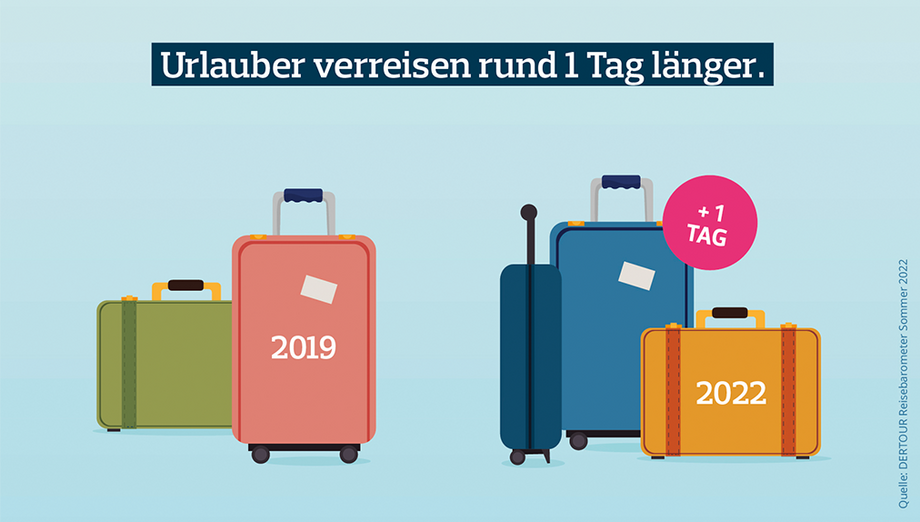
City breaks in particular have become longer: The average duration of city breaks within Germany has increased by around a third (32%) compared to 2019, i.e. 1.3 days, to 5.3 days.
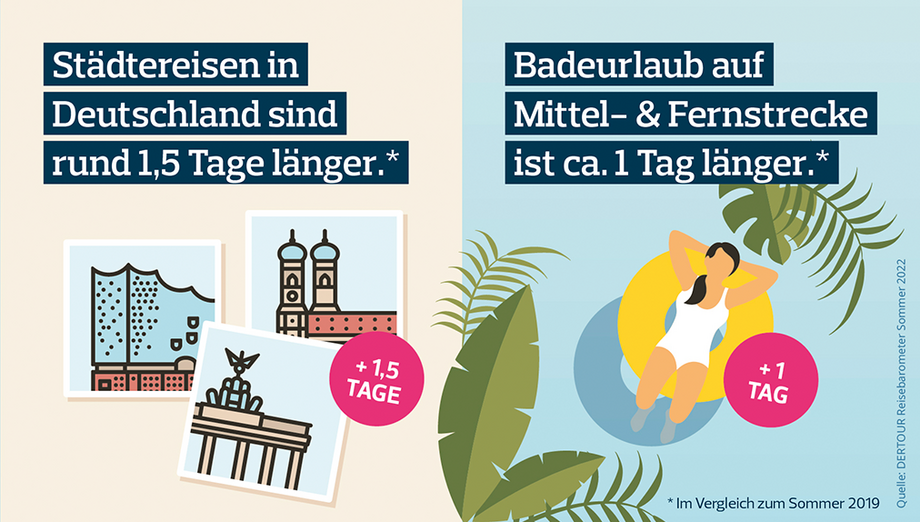
This year, guests are also taking a longer break for beach holidays on the medium and long-haul routes (Indian Ocean, Dominican Republic, Dubai, Abu Dhabi, Thailand, Egypt, Tunisia and other destinations in the western and eastern Mediterranean). The average holiday now lasts 13.5 days, almost 1 day (0.8 days) longer than in 2019.
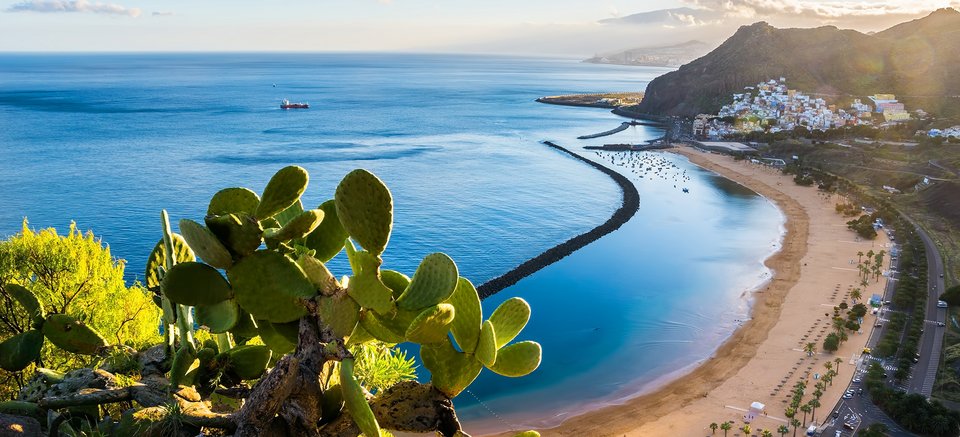
Short-haul & medium-haul: Germany transfers holidaymakers to Mediterranean destinations, Spain the undisputed guest favourite, shooting star Turkey catapults into second place
On short and medium-haul routes, destinations around the Mediterranean are traditionally holidaymakers' favourites. This year, however, they are in even greater demand than in summer 2019. "The enormous desire to travel is drawing holidaymakers further afield again this summer. People are longing for that summer sun and carefree feeling," says Sven Schikarsky. "They want stable good weather and are in the mood for sun and sea in other countries. A different cuisine, a different language - that creates a sense of distance from everyday life, which increases the quality of holidays for many people." Demand for holidays in Germany has fallen accordingly: While holidays in their own country were the second most popular destination in 2019, around a third (35%) fewer guests are opting for them this summer.
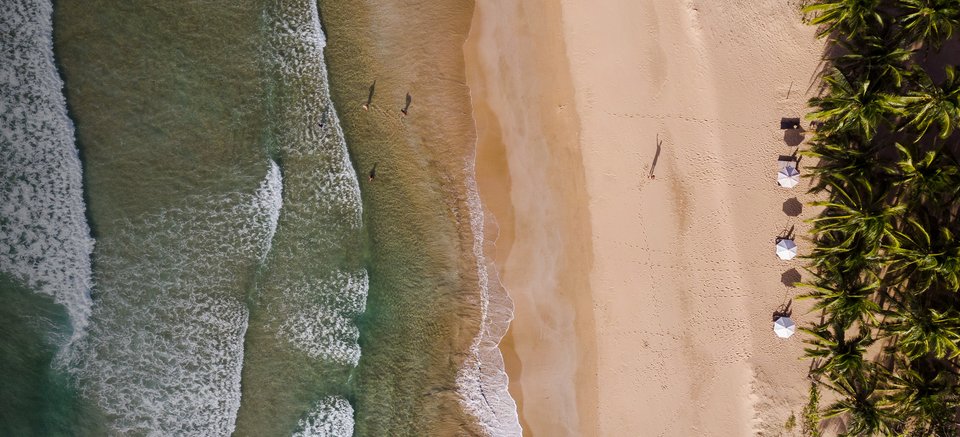
- Spain (+2%)
- Turkey (+76%)
- Greece (+17%)
- Italy (-41%)
- Egypt (+15%)
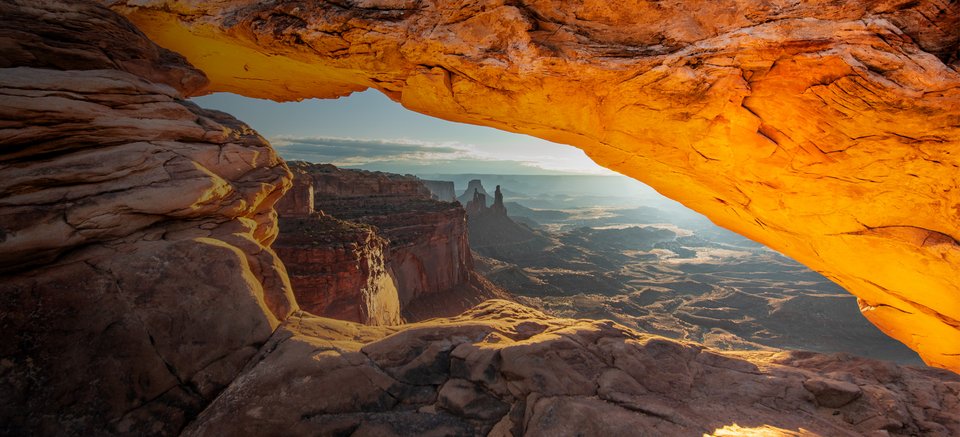
- USA (-33%)
- Maldives (+24%)
- Dom Rep (-12%)
- Mauritius (+/- 0%)
- Thailand (-56%)
Rental car trend continues: demand outstrips supply - better availability from autumn
The desire to "experience" a holiday destination in a hire car remains high. However, there is a shortage on the international car hire market due to the coronavirus and chip shortage. The particularly high demand from domestic tourism in the USA and Canada is also having a restrictive effect: Due to entry restrictions, many Americans and Canadians are holidaying in their own country - and booking a large proportion of the rental car fleets themselves, which was available to international guests in other years. But there is improvement in sight: "Domestic tourism is currently slowing down as North Americans are travelling to other destinations again. This is good news for our key car hire destination, the USA. There will also be more car hire capacity in other popular destinations," predicts Schikarsky. "Things will get better from autumn. However, booking as early as possible remains essential."
Strong demand for campervan holidays too - vehicle shortage is a limiting factor
Despite the late opening of many popular campervan destinations and a shortage of vehicles due to the coronavirus and chip shortage - as with rental cars - campervan trips in summer 2022 reached almost 80% of the booking volume of summer 2019.
The frontrunners among the most popular campervan destinations are and remain the North American destinations of the USA and Canada, which once again account for the majority of campervan bookings this summer.
For the German autumn and winter, there are signs that the campervan market is easing. "This is very good news for all those who want to finally fulfil their dream of a campervan holiday in Australia or New Zealand," says Sven Schikarsky. "The top priority is to book as early as possible. Because the catch-up effect will ensure high demand in autumn and winter, while the fleets will not yet have returned to their former strength."
*The evaluation is based on bookings received by DERTOUR and its sister brands Jahn Reisen, ITS, Meiers Weltreisen and Travelix up to 7 July 2022 for the travel period 1 July to 31 September 2022 compared to bookings received up to the same cut-off date (7 July) for the same travel period (1 July to 31 September) in 2019.


